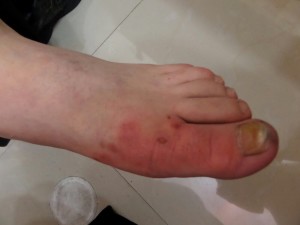Uncategorized
Everything You Need To Know About Eczema Treatment
Eczema, also known as Atopic Dermatitis, is a skin condition in which a person’s skin gets red and itchy. Also, a fluid leak is observed when the rashes are scratched. Although eczema can develop at any stage of one’s life, it usually develops in infancy itself. Eczema in babies is often characterized by rashes on their cheeks and chins. Other body parts that are affected by eczema include knees, elbows, scalp, wrists, and ankles. In other words, all body areas that have a fold are more prone to develop eczema as compared to other body parts.

Eczema treatment involves knowing better about your medical history and allergies. A dermatologist might ask you about your medical history, and also, that of your family, especially whether anyone in your family has allergy-related health conditions. This is because, although there is no direct test to diagnose this skin condition, a good examination of your skin and your medical history might be enough for a dermatologist to be convinced that you have eczema.
As far as eczema treatment is concerned, the first and foremost component is to take good care of your skin. In fact, if you can make the right lifestyle changes and take good care of your skin, you might treat your eczema completely, without any medications. Some of the best ways to take care of your skin include –
- Take warm and short showers on a regular basis, preferably ones of 10 to 15 minutes. However, make sure that the showers are not too long as that may make your skin dry and severe your skin condition. Similarly, too hot water should be avoided.
- Use a mild soap that doesn’t dry out your skin. You can use the gentle soaps called syndets, which you can easily get at a drugstore. Similarly, adding bleach to your bath water kills bacteria and provides relief, and is highly recommended for people having severe cases of eczema.
- Apply a good moisturizer once you dry yourself after taking a bath. Try to pat yourself dry rather than doing it with vigour. Also, apply the moisturizing lotion all over the body and try to avoid a lotion that has fragrances.
- Avoid physical and mental stress as sweat can flare up your condition. Instead, you can do yoga to remain fit and healthy.
Some other medications and eczema treatment methods a dermatologist might prescribe, include –
- Antihistamines
- Hydrocortisone
- Corticosteroids
- UV therapy
- Prescription strength moisturizers
- Immunomodulators
Antihistamines, such as Benadryl are good ways to relieve eczema symptoms. Although some of the oral antihistamines might cause drowsiness, there are various non-drowsy substitutes available as well. Corticosteroids are prescribed by dermatologists when every other medication fails to provide relief from eczema. Thus, you should strictly follow your dermatologist’s directions while taking the corticosteroids. UV rays therapy is good for people having a very severe case of eczema and is not required for people having a mild condition of eczema.
To know more about eczema treatment and a personalised advice for your skin condition, do get in touch with our specialists at HP Dermatology Centre today!

